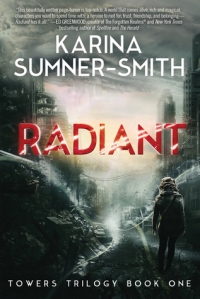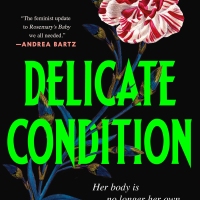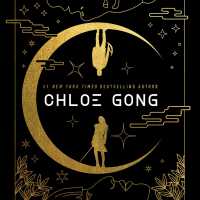Guest Post: “Friendships Between Strong Female Characters” by Karina Sumner-Smith
As you may recall, last month for Sci-Fi November I reviewed Radiant, a brilliant and unique speculative fiction novel debut from Karina Sumner-Smith. What also made this book stand out for me was its focus around a remarkable friendship between Xhea and Shai, two young women from very different walks of life. Hence it is with great honor that we welcome Karina here at the BiblioSanctum today to talk about this very topic!
FRIENDSHIPS BETWEEN STRONG FEMALE CHARACTERS
by Karina Sumner-Smith
 I say “strong female character”—and you cringe.
I say “strong female character”—and you cringe.
It’s okay, I understand the reaction. I think many of us are tired of the cardboard characters presented as “strong”. We all know the type: the attractive, kick-ass girl with a sarcastic comeback for every statement; the one who inevitably catches the eye of nearly every man in the story … and the one who usually ends up needing to be saved, no matter how many guns she’s toting. (Adjust details as required for your genre or medium of choice.)
For me, the idea of a strong female character really means an interesting female character—ideally, a woman who is the protagonist of her own tale, not just a sidekick or a victim or a helpless damsel waiting to be saved. A female character who has her flaws and quirks and bad days, yes, just as she has her intelligence and humor and moments of brilliance.
In other words, a character who reads like a real person.
Yet somewhere along the way, I think the wires got crossed. The typical understanding of a “strong female character” conflates the idea of emotional resilience with physical strength, and autonomy with extreme independence. As frustrating as it is to see the capability for violence stand in as a catch-all symbol for strength, it’s the latter that bothers me most of all.
Why, to be strong, must a female character stand alone? What happened to family and friends? Where are her colleagues and classmates? I wince at the possible subtext: that a smart, capable woman is destined to be alone.
As a reaction to the stereotype of the helpless damsel, or the female character who can’t seem to get anything done without male support, I can understand the appeal of a character who can handle everything just fine on her own, thank you very much. Yet true isolation makes one hurt and brittle, not strong; and collaborating with others, or accepting help when it’s needed (or appreciated), shouldn’t be made into weaknesses.
But if it’s irksome both to have female characters exist and act in isolation, and others who ultimately rely on male help to get the job done, where’s the middle ground? The more I thought about it, the answer seemed simple: not one, but two strong female characters. Women who work together. Women who—dare I say it?—are friends.
When I struggled to find more than a handful of SFF novels with a friendship between women as the story’s core emotional driver, I wrote one. Radiant is about two young women from opposite ends of their society who are thrown together by circumstance and must learn to understand and trust each other if they want to survive.
In many ways, my protagonist, Xhea, is a reaction to that too-independent stereotype. Homeless, desperately poor, and abandoned, Xhea has learned that she can only trust herself. Lacking size and physical strength, her only weapons are her wits, the edge of her too-sharp tongue, and the speed at which she can run away.
Sheltered and gentle and massively powerful, Shai presents a different kind of strength. She is careful and intelligent, and is caught between fear, responsibility, and the creeping realization that she’s been raised to believe a lie. (She also happens to be a ghost—and not even death has saved her from the pursuers on her trail.)
In writing a novel in which the central relationship is not a romance but the development of a friendship between two very different young women, I knew that I was taking a risk. There’s a market for romance, and for kick-ass female loners—but friendship? Never mind a publisher’s marketing team; I wasn’t sure how to connect with the audience for this novel. Who raves and cheers about two women working to trust and understand each other?
Me, I realized. I was that person. I hope that you are too.
* * *
Karina Sumner-Smith is a fantasy author and freelance writer. Her debut novel, Radiant, was published by Talos/Skyhorse in September 2014, and in audiobook by Audible Studios. The second and third books in the trilogy are scheduled to follow in 2015. Prior to focusing on novel-length work, Karina published a range of fantasy, science fiction and horror short stories, including Nebula Award nominated story “An End to All Things,” and ultra-short story “When the Zombies Win,” which appeared in two Best of the Year anthologies. Visit her at karinasumnersmith.com.













It’s always interesting to have a strong character like that in a book you’re right. In any case, all that sounds really intriguing. Thanks for the post!
LikeLike
I do like strong characters, and to see the building for a friendship…sure 🙂
LikeLike
Wonderful. I despise the Strong Female CharacterTM trend for all the reasons you describe, so it’s refreshing to see something different — something normal! It’s sad that the Bechdel Test has to exist, but hopefully, with books like this out, more and more people will realize that there’s a whole lot more to ‘SFCs’ than kicking ass.
LikeLike
I agree, the tag “Strong Female Character” has been thrown around too much. I am even hesitant to use the term in my reviews now, unless I feel the character really deserves it.
LikeLike
Yep, totally agree with Wendy. Loving the sound of Radiance.
LikeLike
Stories with strong friendships are my favorites. I think it must be easier to write the obvious romance, but friendship stories often seem to be more interesting. Looking forward to reading Radiant!
LikeLike
Very true, I think a lot of authors are pressured these days to throw in the romance. Friendships between women are neglected.
LikeLike
I was thinking the same thing… too often it seems that “Strong Female Character” is almost a token addition. I think it’d be awesome to read a story where “Strong Female Characters” are the norm instead of the outliers. I love the way you think! I’ve already got your book on my Christmas list. XD I can’t wait to read it!
LikeLike
I may be in the minority on this one, but I’m happy whenever I see “strong female character” pop up in reviews. I agree that far too many of them are forced to stand on their own though, and BFFs tend to be some of my favourite secondaries. Friendship dynamics are a nice change from romance.
Carmel @ Rabid Reads
LikeLike
A huge difference between urban fantasy and other genres too. I’m not surprised you see a lot of mentions of strong female characters pop up in reviews you read, since UF has quite a few of them 🙂
LikeLike
Great post, and yes, there are far too many superficially “strong female characters” who are exactly as you describe. (I think I’ve seen more on TV than in fiction, but they’re certainly all over.) Not that there is anything inherently wrong with relying on male help/ rescue, any more than relying on female/genderqueer help/ rescue, it just shouldn’t happen in every other book!
Anyway, Radiant sounds awesome. Plus that cover is gorgeous. Thinking I might have to read it 🙂
LikeLike
Wonderful post! I found myself nodding in agreement while reading: we need more **real persons** in fiction, indeed, and not characters that are a sort of rebound from classical and trite clichés….
LikeLike
I do think their friendships are usually glossed over too much hence why I appreciate them so much more when I come across a good one.
LikeLiked by 1 person
Interesting. I do love strong female characters, and can also feel romance can be a distraction or unnecessary. Quite interested in this.
LikeLike
I completely agree. I’m so underwhelmed by a lot of romances in books these days, exactly because they feel like they’re thrown in for the sake of having one.
LikeLike
The friendship between Xhea and Shai was one of my favorite aspects of Radiant. It’s a welcome change from a romance and from the “strong female character” stereotype. Not that I mind either one – there are great examples of both out there – but it’s refreshing to see a writer explore a different kind of relationship for once.
Great article, Karina!
LikeLike
Well said! I don’t have any problems with the strong female character type described by Karina, but it’s tiresome to see that and only that in every other book I pick up. Variety is important and more real.
LikeLiked by 1 person
Good point. My favorite female protagonists tend to be ones who are dynamic and who have their insecurities or flaws. I like it when a story gives that kind of character an opportunity to overcome themselves or learn something that changes them in some way.
LikeLike
Thanks again, Karina, for the awesome guest post!
LikeLike
Yes, I have read many ‘strong’ female character exactly like that. I totally agree with your idea of strong. Strong shouldn’t mean perfect, just real, and not someone who needs rescuing, but not alone all the time either. I love family relationships and friendships in books! There aren’t enough of them! Especially friendships between two women. Bravo for having the guts to write one!
LikeLike
Pingback: Book Review: Defiant by Karina Sumner-Smith | The BiblioSanctum
Pingback: Book Review: Towers Fall by Karina Sumner-Smith | The BiblioSanctum